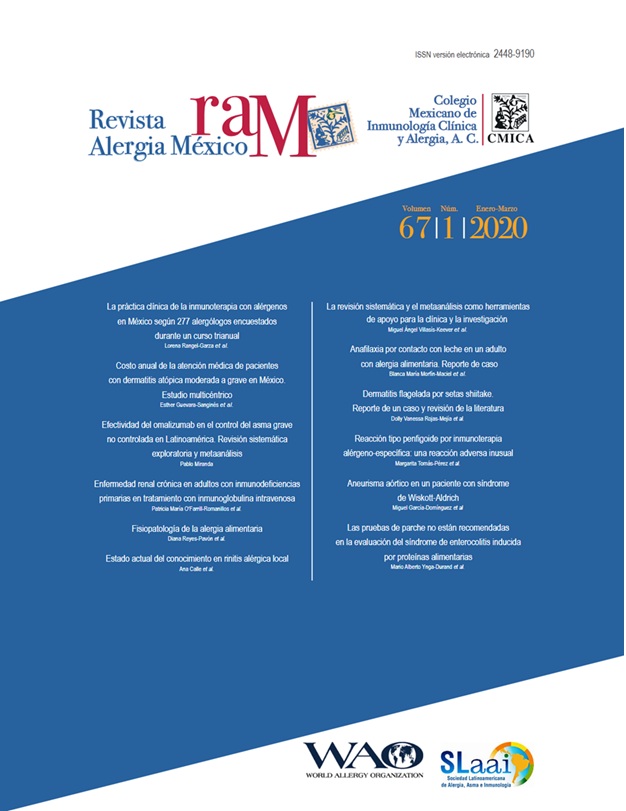Abstract
Background: Intravenous immunoglobulin (IVIG) is the treatment of choice for humoral primary immunodeficiency diseases (PIDs). A third of the patients who receive intravenous immunoglobulin have adverse reactions, such as osmotic nephrosis.
Objective: To assess the presence of kidney disease in adults with humoral PIDs, in treatment with intravenous immunoglobulin.
Methods: A cross-sectional, descriptive, and observational study of patients who belong to the PID Clinic of the Specialties Hospital of the National Medical Center “Siglo XXI”, Mexico City, who receive treatment with intravenous immunoglobulin. A questionnaire with demographic information, 24h urine creatinine clearance, serum creatinine, urea, and BUN (Blood Urea Nitrogen) was applied.
Results: 35 patients were surveyed; 65.7 % were women; the average age was 34 years; 51.4 % of the patients presented kidney damage. Those with > 5 years of treatment with intravenous immunoglobulin presented chronic kidney disease (CKD) with more frequency (55.6 %) according to the KDOQI scale.
Conclusions: Chronic kidney disease occurs in 51 % of adult patients with PID who have been treated with intravenous immunoglobulin for more than 5 years; which is why these patients require periodic evaluations of their kidney function, and the use of sugar-free immunoglobulin in order to reduce the risk.
References
Hernández-Martínez C, Espinosa-Rosales F, Espinosa-Padilla SE, Hernández-Martínez AR, Blancas-Galicia L. Conceptos básicos de las inmunodeficiencias primarias. Rev Alerg Mex. 2016;63(2):180-189. DOI: 10.29262/ram.v63i2.146
Bousfiha A, Jeddane L, Picard C, Ailal F, Bobby-Gaspar H, Al-Herz W, et al. The 2017 IUIS phenotypic classification for primary immunodeficiencies. J Clin Immunol. 2018;(38):129-143. DOI: 10.1007/s10875-017-0465-8
Fischer A, Rausell A. What do primary immunodeficiencies tell us about the essentiality/redundancy of immune responses? Semin Immunol. 2018;(36):13-16. DOI: 10.1016/j.smim.2017.12.001
Srinivasa BT, Alizadehfar R, Desrosiers M, Shuster J, Pai NP, Tsoukasa CM. Adult primary immune deficiency: What are we missing? Am J Med. 2012;125(8):779-786. DOI: 10.1016/j.amjmed.2012.02.015
European Society for Primary Immunodeficiencies. ESID Registry-Working definitions for clinical diagnosis of PID. Italia: ESID; 2019. Disponible en: https://esid.org/content/download/16628/452872/file/ESIDRegistry_ClinicalCriteria.pdf
Bonilla FA, Barlan I, Chapel H, Costa-Carvalho BT, Cunningham-Rundles C, Espinosa-Rosales FJ, et al. International Consensus Document (ICON): Common variable immunodeficiency disorders. J Allergy Clin Immunol Pract. 2016;4(1):38-59. DOI: 10.1016/j.jaip.2015.07.025
Aucouturier P, Mariault M, Lacombe C, Preud´homme JL, Frequency of selective IgG subclass deficiency: A reappraisal. Clin Immunol Immunopathol. 1992;63(3):289-291. DOI: 10.1016/0090-1229(92)90236-h
Herrod HG, Clinical significance of IgG subclases. Curr Opin Pediatr. 1993;5(6):696-699. DOI: 10.1097/00008480-199312000-00010
Espinosa-Rosales FJ, Bergés-García A, Coronado- Zarco IA, Dávila-Gutiérrez G, Faugier-Fuentes E, García-Campos JA, et al. Consenso mexicano para la prescripción de inmunoglobulina G como tratamiento de reemplazo e inmunomodulación. Acta Pediatr Mex. 2018;39(2):134-171. DOI: 10.18233/apm39no2pp134-1711574
Ballow, M. Practical aspects of immunoglobulin replacement. Ann Allergy Asthma Immunol. 2017;119(4):299-303. DOI: 10.1016/j.anai.2017.07.020
Orange JS, Hossny EM, Weiler CR, Ballow M, Berger M, Bonilla FA, et al. Use of intravenous immunoglobulin in human disease: a review of evidence by members of the Primary Immunodeficiency Committee of the American Academy of Allergy, Asthma and Immunology. J Allergy Clin Immunol. 2006;117(Suppl 4):S525-S553. DOI: 10.1016/j.jaci.2006.01.015
Goudouris ES, Rego Silva AM, Ouricuri AL, Grumece AS, Condino-Neto A, Costa-Carvalho BT, et al. II Brazilian Consensus on the use of human immunoglobulin in patients with primary immunodeficiencies. Einstein (Sao Paulo). 2017;15(1):1-16. DOI: 10.1590/S1679-45082017AE3844
Dantal J. Intravenous immunoglobulins: in-depth review of excipients and acute kidney injury risk. Am J Nephrol. 2013;38(4):275-284. DOI: 10.1159/000354893
Kaveri SV, Lecerf M, Saha C, Kazatchkine MD, Lacroix-Desmazes S, Bayry J. Intravenous immunoglobulin and immune response. Clin Exp Immunol. 2014;178(Suppl 1):94-96. DOI: 10.1111/cei.12526
Guo Y, Tian X, Wang X, Xiao Z. Adverse effects of immunoglobulin therapy. Front Immunol. 2018;9:1299. DOI: 10.3389/fimmu.2018.01299
Caress JB, Kennedy BL, Eickman KD. Safety of intravenous immunoglobulin treatment. Expert Opin. Drug Saf. 2010;9(6): 971-979. DOI: 10.1517/14740338.2010.484419
Marie I, Cherin O, Michaellet M, Pelus E, Dantal J, Crave JC, et al, Management of adverse effects related to human immunoglobulin therapy: recommendations for clinical practice. Rev Med Interne. 2017;38(5):312-319. DOI: 10.1016/j.revmed.2016.10.390
Levine AA, Levine TD, Clarke K, Saperstein D. Renal and hematologic side effects of long-term intravenous immunoglobulin therapy in patients with neurologic disorders. Muscle Nerve. 2017;56(6):1173-1176. DOI: 10.1002/mus.25693
Lin RY, Rodríguez-Baez G, Bhargave GA, Lin H. Intravenous gammaglobulin-associated renal impairment reported to FDA: 2004-2009. Clin Nephrol. 2011;76(5):365-372. DOI: 10.5414/cn106824
Rodríguez-Mireles KA, Galguera-Sauceda A, Gaspar-López A, López-Rocha EG, Campos-Romero FH, del Rivero-Hernández LG, et al. Efectos adversos de la aplicación ambulatoria de inmunoglobulina intravenosa en adultos con inmunodeficiencia común variable, Rev Alerg Mex. 2014;61(3):131-140. DOI: http://dx.doi.org/10.29262/ram.v61i3.37
Gaspar-López A, Miranda-Novales MG, López-Rocha EG, Rodríguez-Mireles KA, Segura-Méndez NH. Estimación de la tasa de filtración glomerular en adultos con inmunodeficiencia común variable tratados con inmunoglobulina intravenosa. ¿Qué fórmula utilizar? Rev Alerg Mex. 2014;61(2):45-51. DOI: http://dx.doi.org/10.29262/ram.v61i2.25
Levin A, Stevens PE, Bilous RW, Coresh J, de Francisco ALM, Griffith KE, et al. Kidney disease: Improving Global Outcomes (KDIGO) CKD work group. KDIGO 2012 clinical practice guideline for the evaluation and management of chronic kidney disease. Kidney Int Suppl. 2013;3(1):1-150. DOI: 10.1038/kisup.2012.73

This work is licensed under a Creative Commons Attribution-NonCommercial 4.0 International License.
Copyright (c) 2020 Revista Alergia México

